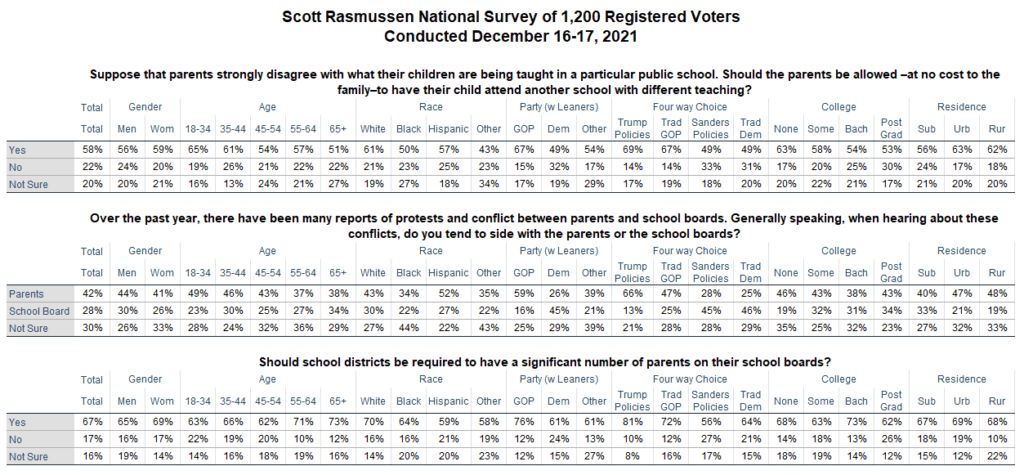Over the past year, there have been many reports of protests and conflict between parents and school boards. A Scott Rasmussen national survey found that 42% of voters generally side with the parents while 28% side with the school boards. Thirty percent (30%) are not sure.
Republicans tend to side with the parents by a 59% to 16% margin. Democrats take the opposite view and side with the school boards by a 45% to 26% margin. Among Independents, 39% side with the parents and 21% with the school boards.
Sometimes, of course, parents strongly disagree with what their children are being taught in a particular public school. If that happens, 58% believe the parents should be allowed–at no cost to the family–to have their child attend another school with different teaching. Just 22% disagree.
Sixty-seven percent (67%) believe school districts should be required to have a significant number of parents on their school boards.
SIGN UP to receive Scott’s free email newsletter.
CHECK OUT Scott’s latest polls.
Note: Neither Scott Rasmussen, ScottRasmussen.com, nor RMG Research, Inc. have any affiliation with Rasmussen Reports. While Scott Rasmussen founded that firm, he left more than seven years ago and has had no involvement since that time.
Question 1:
Suppose that parents strongly disagree with what their children are being taught in a particular public school. Should the parents be allowed–at no cost to the family–to have their child attend another school with different teaching?
58% Yes
22% No
20% Not sure
Question 2:
Over the past year, there have been many reports of protests and conflict between parents and school boards. Generally speaking, when hearing about these conflicts, do you tend to side with the parents or the school boards?
42% Parents
28% School Board
30% Not sure
Question 3:
Should school districts be required to have a significant number of parents on their school boards?
67% Yes
17% No
16% Not sure
Methodology
The survey of 1,200 Registered Voters was conducted online by Scott Rasmussen on December 16-17, 2021. Field work for the survey was conducted by RMG Research, Inc. Certain quotas were applied, and the sample was lightly weighted by geography, gender, age, race, education, internet usage, and political party to reasonably reflect the nation’s population of Registered Voters. Other variables were reviewed to ensure that the final sample is representative of that population.



